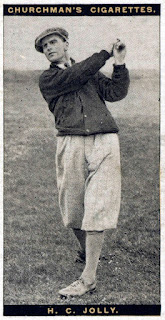Herbert Jolly: Beat Hagen, Played in First Ryder Cup
Full name: Herbert Charles Jolly
Date of birth: February 15, 1895
Place of birth: Vale, Guernsey, Channel Islands
Date and place of death: April 16, 1983, in Bradford, West Yorkshire, England
Also known as: Commonly called "Bert" by friends. In publications, sometimes called "H.C. Jolly."
Jolly's Biggest Wins
- 1923 Yorkshire Evening News Tournament
- 1930 Yorkshire Evening News Tournament
- 1931 Roehampton Invitation Tournament
In the Majors
Bert Jolly played in the U.S. Open once, tying for 42nd place in 1927. He never played The Masters or the U.S. PGA Championship. He played the British Open 13 times, first in 1920 and last in 1936. Jolly's only Top 10 finish was a tie for eighth in the 1923 Open. He also had a Top 15 finish in the 1929 Open.
More About Herbert Jolly
Herbert Jolly, born on the island of Guernsey in the Channel Islands (Harry Vardon and Ted Ray were also Channel Islanders, though born on Jersey), played for Team Great Britain in the very virst Ryder Cup. But he also played in the precursor to the first Ryder Cup — the proto-Ryder Cup, you might say.In 1926, Walter Hagen brought a team of 10 American golfers to the Wentworth Club near London, to compete for a new cup (trophy) that was being donated by Samuel Ryder. But it turned out that cup wasn't ready yet, and so that 1926 USA-vs.-Great Britain match is not officially part of the Ryder Cup history. It is considered a sort of unofficial introduction of the concept, though, and Jolly was a member of that 1926 British team. And he was on the dominant, winning side: Great Britain won that 1926 match by a 13-1 score.
The official start of the Ryder Cup came a year later. Jolly was originally left off the British side announced for that 1927 Ryder Cup. But Jolly, 32 years old at the time, was called into the team when Abe Mitchell was forced to withdraw following appendix surgery. Jolly was added to the team after the rest of its players had already set sail for New York on the passenger ship Aquitania. Jolly hopped on another ship, the Majestic, and made it to New York four days later.
But after that effort, Jolly lost both matches he played. In foursomes, Jolly and partner Arthur Havers fell to Gene Sarazen/Al Watrous, 3 and 2. In singles, Jolly lost to Johnny Golden, 8 and 7. Team USA won the 1927 Ryder Cup, 9.5 to 2.5. Still, Jolly forever will be remembered for playing in the very first Ryder Cup. The last-minute cross-ocean voyage also gave him the chance to stick around and play in the U.S. Open a few weeks later, his only appearance in a major other than the British Open.
Jolly never played in another Ryder Cup. He among the first six members of Team GB announced for the 1931 Ryder Cup, but, after failing to make it through qualifying for the British Open that year, Jolly withdrew from the Cup team.
The Ryder Cup of 1927, and the unofficial one of 1926, weren't Jolly's first experiences with the legendary Walter Hagen, though. His first claim to fame was winning the 1923 Yorkshire Evening News Tournament, the inaugural playing of that event.
Jolly only got into the match play bracket in 1923 by winning a four-way playoff for the last qualifying spot. En route to the championship match, he beat Abe Mitchell (on the seventh extra hole), the man he would replace on the 1927 Ryder Cup roster.
In the championship match, Jolly found Hagen waiting for him. Hagen's legend was already far along: He had won all three of the professional majors in existence at that time (two U.S. Opens, one each of the PGA Championship and British Open). Hagen would have been considered a huge favorite to beat Jolly.
The final was 36 holes, and after the 26th hole Jolly was 4-up on Hagen. But Hagen won four of the next six holes to level the match. Jolly went 1-up on the 17th, then won the last for the 2-up victory.
Jolly won the Yorkshire Evening News Tournament again in 1930. And in addition to his two wins in the tournament, Jolly reached the championship match of the Yorkshire Evening News Tournament three years running in 1927, 1928 and 1929. But he lost by 9-and-8 scores to the Whitcombe brothers the first two of those years, Ernest Whitcombe in 1927 and Charles Whitcombe in 1928. And in the 1929 championship match, Joe Turnesa made eagle on the 37th hole to beat Jolly, 1-up.
Jolly's only other big win on the pro cirtuit of the time was in the 1931 Roehampton Invitation, also a match-play tournament. Jolly holed a 21-foot putt on the final hole to beat Charles Whitcombe, 1-up.
Jolly's career in professional golf began in his teens when he became an assistant pro on his home island at Royal Guernsey Golf Club. While there, in 1914, he gave lessons to the 7-year-old Henry Cotton, who became a 3-time Open Championship winner and Hall-of-Famer.
Just prior to the outbreak of World War I, in 1914, Jolly moved to Foxgrove Golf Club near London. That same year he volunteered for World War I as part of the "Niblick Brigade," a squadron of volunteers within the 13th Battalion, Rifle Brigade, comprised mostly of assistant golf professionals. According to AntiqueGolfScotland.com, "(Jolly) was promoted to Sergeant in November 1914, and after being hospitalised back in England with nephritis in 1916 transferred to the North Hampshire Regiment and later the Royal Defence Corps and the ARRC."
After the war, Jolly returned as professional at Foxgrove, a club that closed in 1933. He moved around a couple of times before settling in as the pro at Branshaw Golf Club in West Yorkshire, England, where he spent the next several decades before retiring.

